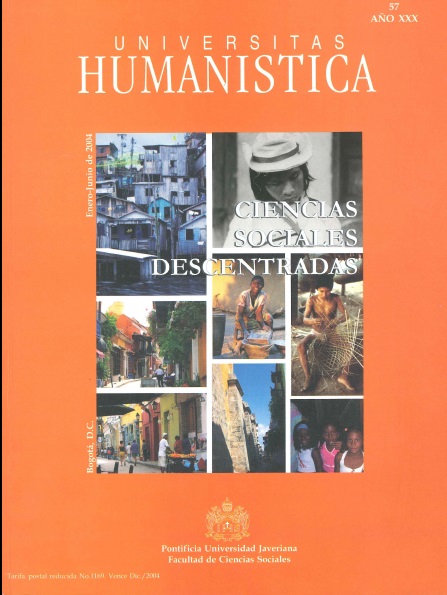Abstract
Entender la escritura como viaje hace posible leer la itinerancia de Maqroll como saga que se inserta en la tradición de la literatura de viajes en su doble configuración: como aventura y viaje a ultramar en el juego intertextual con la obra de Conrad y particularmente con El corazón de las tinieblas, paradigma de la literatura colonial, y como viaje interior donde la escritura se hace representación para develar el sentido de la errancia.
La epifanía de la errancia coincide con el momento en que el hombre se echa sobre sus hombros la pesada piedra para volver a conquistar la cima, como lo entiende Camus en su relectura del mito de Sísifo, de allí que el hilo conductor de la saga sea la aventura que sabe siempre fallida al ser vivida en la desesperanza.

This journal provides immediate open access to its content on the principle that making research freely available to the public, encourages greater global exchange of knowledge.
The journal Universitas Humanística is registered under a Creative Commons Attribution 4.0 International Public License. Thus, this work may be reproduced, distributed, and publicly shared in digital format, as long as the names of the authors and Pontificia Universidad Javeriana are acknowledged. Others are allowed to quote, adapt, transform, auto-archive, republish, and create based on this material, for any purpose (even commercial ones), provided the authorship is duly acknowledged, a link to the original work is provided, and it is specified if changes have been made. Pontificia Universidad Javeriana does not hold the rights of published works and the authors are solely responsible for the contents of their works; they keep the moral, intellectual, privacy, and publicity rights.
Approving the intervention of the work (review, copy-editing, translation, layout) and the following outreach, are granted through an use license and not through an assignment of rights. This means the journal and Pontificia Universidad Javeriana cannot be held responsible for any ethical malpractice by the authors. As a consequence of the protection granted by the use license, the journal is not required to publish recantations or modify information already published, unless the errata stems from the editorial management process. Publishing contents in this journal does not generate royalties for contributors.


